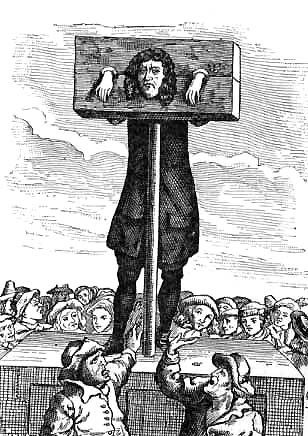All-too-human Puritans
Arthur Kroker just published a long essay about "The Born Again Ideology". He begins by showing that an old classic of sociology must be updated for the new era of imperialist Puritanism -- Max Weber's The Protestant Ethic and the Spirit of Capitalism has proven to be historically right about how the puritan practices supported the rise of capitalism. The protestant ethic and puritanism especially emphasized hard work, "industry and frugality", pursuit of a calling and a trade, of mastering this world in service to an afterworld, and private rather than public enterprise. Altogether this package deal led to the unintended consequence of accumulated wealth and concentration of capital on a private basis to the neglect of public good. Hence, capitalist forces have been supportive of protestantism and vice-versa. They were always united in mutually coadaptive principles. This was the core of Weber's many-faceted jewel of a study. Now, circa 2005 thrown into the age of neo-empire and its endless war against infidels, along with the reassertion of both the puritan ethic (rightwing fundamentalist christians in power) and the spirit of capitalism (neoliberal global corporatism), Max Weber again seems more relevant than ever. But of course history returns with a difference, spiraling back in surprisingly unprecedented ways. Kroker details what's new in this old formula. He also reads Nietzsche as predicting the human-all-too-human struggles of the "last man" in today's American ideological struggles.
Now, circa 2005 thrown into the age of neo-empire and its endless war against infidels, along with the reassertion of both the puritan ethic (rightwing fundamentalist christians in power) and the spirit of capitalism (neoliberal global corporatism), Max Weber again seems more relevant than ever. But of course history returns with a difference, spiraling back in surprisingly unprecedented ways. Kroker details what's new in this old formula. He also reads Nietzsche as predicting the human-all-too-human struggles of the "last man" in today's American ideological struggles.This is how Kroker concludes his analysis:
~~~ ~~~ ~~~
It is, I believe, the primal spirit of the Puritan Vampire --
redemptive, violent, extra-terrestrial in its spiritual ambitions,
steeped in the blood sacrifices of the Old Testament -- it this
spirit of the Puritan Vampire which issues again through the
political rhetoric of faith-based politics. Here, "brittle piety" is
swept away by feverish faith. Individual "bitterness" is collectively
masked as the "culture of life" movement. "Hatred of existence" is
transformed into the missionary consciousness of the "redemptive
empire." Signs of the Puritan vampire are legion: from fundamentalist
faith in the vision of "premillenial dispensationalism" to the new
Covenant of the Mayflower Compact; from the current language of
crusading imperialism to Puritan beliefs in the necessary application
of redemptive violence against the body, particularly the unruly
bodies of outlaw women, witches, and sorcerers. Signs of the ecstatic
spirit of disciplinary Puritanism are everywhere: from the
military's obsession with sexual perversion -- Abu Ghreib rethought
now in the words of a Texas defense lawyer as normal "cheerleader
sports" to an almost fetishistic obsession among the "organized weak"
with purifying "traditional marriage" of the perceived "social
contamination" of gay and lesbian love. From delirious White House
ecstasy with visions of Armaggedon to the Puritan rapture of the New
Protestant Ethic, public life embodies a sense of time curving
backwards, with the spirit of the Puritan Vampire as the future of
faith-based politics.
Here is the moral essence of American triumphalism. Here is why
American empire, which may objectively -- strategically -- already
in rapid decline from economic over-indebtedness, military
over-expansion, media hubris, could also only be in its infancy.
Nietzsche once remarked of that strange creature we call a human
being that for all its resentment, cruelty, paranoia and fetishes,
for all of its panic fear of the inner abyss and desperate struggles
against the cage of its own moral conscience, it was a will, it was
a going forth, and "nothing besides." Stopping for a moment from
their game of wagers, the pantheon of gods took notice that with this
birth of the "human, all-too-human," something fundamentally new was
happening. But then Nietzsche was always the first philosopher of the
American mind. If he could prophecize that he would only be
understood posthumously, perhaps it was because his reflections on
the "last man" as the final outcome of the will to power would only
really take hold in the shadows of American empire in the 21st
century. Equally, Nietzsche's philosophical twin, Rene Girard, could
write so eloquently and truthfully about "sacrificial violence"[15]
because he too sensed the advent of the desolation of redemptive
violence with its cruel episodes of "scapegoating" and "sacrificial
violence" as the "end times" of Armaggedon. Strangers in their own
times, migrants of the darkness of intellectual imagination,
Nietzche's "last man" and Girard's "sacrificial violence" remain
strong psychic pulsars, pointing the way to the social apocalypse of
Puritan eschatology once resurrected in the form of faith-based
politics.
~~~ ~~~ ~~~
If this sounds right, follow the link above to his whole essay.
If it doesn't sound right, then follow the link below to his whole essay.
http://www.ctheory.net/text_file.asp?pick=451



1 Comments:
That's a brilliant synopsis. Outstanding.
Post a Comment
<< Home